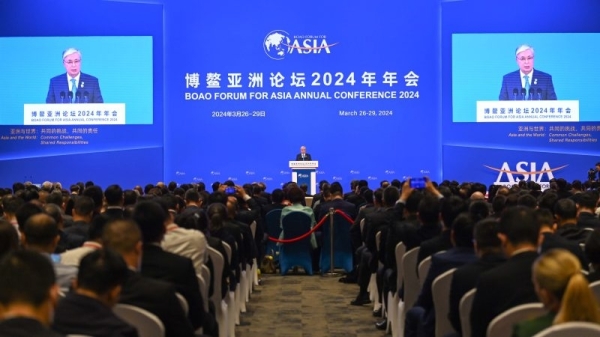In China, Kazakh President highlights Asia’s leading economic role

The President of Kazakhstan Kassym-Jomart Tokayev highlighted Asia’s leading role in new development paradigms at the Boao Forum for Asia (BFA) on the Chinese island of Hainan on Thursday (28 March).
The Boao Forum for Asia, initiated by 25 Asian countries and Australia, is a non-profit organisation based in Beijing, hosting high-level forums for leaders from government, business, and academia in Asia and other continents, sharing their vision on the most important and urgent issues in this region and the world at large. The Chairman of BFA is Ban Ki-moon, former UN Secretary-General.
Asia’s ‘economic dominance and innovation’
Accounting for 53% of global trade with its top technology centers already providing 70% of patent developments, Asia is expected to contribute 60% of global GDP growth within a year, said Tokayev.
Tokayev said that the BFA, holding its 23rd annual meeting this year, under the theme Asia and the World: Common Challenges, Shared Responsibilities, was proof of Asia’s innovative approach to universal economic progress and China’s commitment to global development.
Tokayev’s views strike a chord with Beijing’s messages.
China aims to be a strong driving force for global economic recovery this year, opening its markets wider to foreign investors and promoting high-quality growth, the country’s top legislator Zhao Leji said on Thursday.
China will make tech innovation a new point of economic growth and is willing to collaborate with other countries on it, Zhao, the chairman of the Standing Committee of the National People’s Congress, said at the opening plenary of BFA.
Touching on Kazakh-Chinese relations, Tokayev underscored Kazakhstan’s role as China’s primary trade partner in Central Asia, with bilateral trade reaching a historic $41 billion in 2023 and cargo transportation increasing by 22% to nearly 30 million tons.
According to Tokayev, Kazakhstan’s strategic location within the Belt and Road Initiative, is carrying 80% of all land transport between China and Europe, positioning it as a critical transit hub bridging East and West.
Kazakhstan’s economic vision
Focusing on the country’s new economic course, the President declared that the country would maintain growth of at least 6% and double the economy by 2029. He invited Asian partners, particularly Chinese investors, to capitalize on Kazakhstan’s open-door policy and liberal market reforms.
Tokayev outlined several urgent tasks to bolster fiscal and monetary systems, expand financial flows, and enhance institutional quality to foster a transparent and competitive economy.
He stressed the global need for a new multilateral trading system based on fairness and openness to address escalating trade barriers, protectionism, and treaty violations.
In addition, the Kazakh president advocated for equitable opportunities in the global financial system and urged intensified efforts in sustainable financing.
Panda bonds
He pointed out, “The Eurasian Development Bank plans to issue the first panda bonds as a new financial investment tool. It can become critical for financing global infrastructure projects.”
A Panda bond is a Chinese renminbi-denominated bond from a non-Chinese issuer, sold in the People’s Republic of China. In June 2016, the Bank of China signed a Memorandum of Understanding on panda bonds issuance with Poland’s Ministry of Finance, making Poland the first European sovereign government to issue such bonds.
Elaborating on the food security situation, Tokayev highlighted Kazakhstan’s commitment to leveraging its agricultural potential, particularly in wheat production, to ensure global food stability through international cooperation and innovative technologies.
The President emphasised the strategic importance of enhancing transit and transport cooperation in Asia, noting the critical role of the Trans-Caspian International Transport Route and North-South corridor in securing efficient supply chains between Asia and Europe.
Tokayev also endorsed China’s Global Artificial Intelligence (AI) Governance Initiative, stressing the significance of strengthening technological cooperation and expressing Kazakhstan’s interest in collaborating with leading Asian technology giants.
He identified extracting critical raw materials, such as rare earth metals, as a promising area for international partnerships.
“We continue to work with international partners on the most effective ways to develop our large deposits of uranium, lithium, titanium, and other rare earth elements,” he said.
Kazakhstan, a country rich in critical raw materials has signalled its willingness to develop this potential with the EU countries.

Kazakhstan tells EU: We can supply all 30 critical raw materials you need
Officials from Kazakhstan told a Brussels audience on Thursday (17 November) that the resource-rich country in the near future be able to offer all the 30 critical raw materials the Union needs, according to a list adopted in 2020.
The President reiterated Asia’s decisive role in shaping the global future course and emphasized the importance of international dialogue platforms such as the BFA and Astana International Forum.
The next edition of the Astana International Forum (AIF) will be held in the Kazakh capital on 13 and 14 June.
The AIF is an upgrade of the Astana Economic Forum, held yearly since 2008. The name change reflects the broader range of topics discussed at the new forum, such as climate, food, and energy security, and its ambition to bring attendees, from across the world.

Sanctions and trade wars take centre stage at Astana forum
The Western policy of sanctions against Russia is not without criticism, particularly in central Asia, according to high-level speakers at the inaugural Astana International Forum (AIF), which opened on Thursday (8 June) in the Kazakh capital.
Read more with Euractiv




